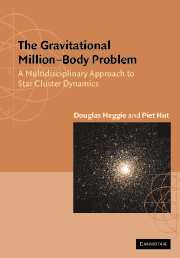Book contents
- Frontmatter
- Contents
- Preface
- PART I INTRODUCTIONS
- PART II THE CONTINUUM LIMIT: N → ∞
- PART III MEAN FIELD DYNAMICS: N = 106
- 10 Violent Relaxation
- 11 Internal Mass Loss
- 12 External Influences
- PART IV MICROPHYSICS: N = 2
- PART V GRAVOTHERMODYNAMICS: N = 106
- PART VI GRAVITATIONAL SCATTERING: N = 3
- PART VII PRIMORDIAL BINARIES: N = 4
- PART VIII POST-COLLAPSE EVOLUTION: N = 106
- PART IX STAR CLUSTER ECOLOGY
- Appendix A A Simple N-Body Integrator
- Appendix B Hints to Solution of Problems
- References
- Index
12 - External Influences
Published online by Cambridge University Press: 05 June 2012
- Frontmatter
- Contents
- Preface
- PART I INTRODUCTIONS
- PART II THE CONTINUUM LIMIT: N → ∞
- PART III MEAN FIELD DYNAMICS: N = 106
- 10 Violent Relaxation
- 11 Internal Mass Loss
- 12 External Influences
- PART IV MICROPHYSICS: N = 2
- PART V GRAVOTHERMODYNAMICS: N = 106
- PART VI GRAVITATIONAL SCATTERING: N = 3
- PART VII PRIMORDIAL BINARIES: N = 4
- PART VIII POST-COLLAPSE EVOLUTION: N = 106
- PART IX STAR CLUSTER ECOLOGY
- Appendix A A Simple N-Body Integrator
- Appendix B Hints to Solution of Problems
- References
- Index
Summary
In this chapter we add one ingredient to the topics discussed in the previous chapter. There we outlined what happens to a stellar system when it loses mass, by whatever mechanism. Implicitly, however, we assumed that the system was isolated. Now we add to the picture the fact that the stars in a stellar system are also affected by surrounding matter, and this is especially true of escaping stars. The picture we have in mind is of a system like a globular cluster, orbiting inside a galaxy, which is simply another stellar system, but much larger and more massive.
The way in which the galaxy affects the cluster depends on such factors as the orbit of the cluster, and the distribution of mass within the galaxy. We begin with the simplest non-trivial idealisation. We assume that the orbit of the barycentre of the cluster is circular of radius R. Clearly, this is possible only for certain types of galaxy, e.g. those with axisymmetric potentials φg. We use an accelerating and rotating frame of reference with origin at the barycentre of the cluster, such that the x-axis points radially outward, and the y-axis points in the direction of motion of the cluster. The acceleration of a star in the cluster has several terms, due to: (i) the field of the galaxy; (ii) the gravitational field, φ, of the cluster; (iii) inertial forces, i.e. Coriolis and centrifugal terms.
- Type
- Chapter
- Information
- The Gravitational Million–Body ProblemA Multidisciplinary Approach to Star Cluster Dynamics, pp. 110 - 118Publisher: Cambridge University PressPrint publication year: 2003



